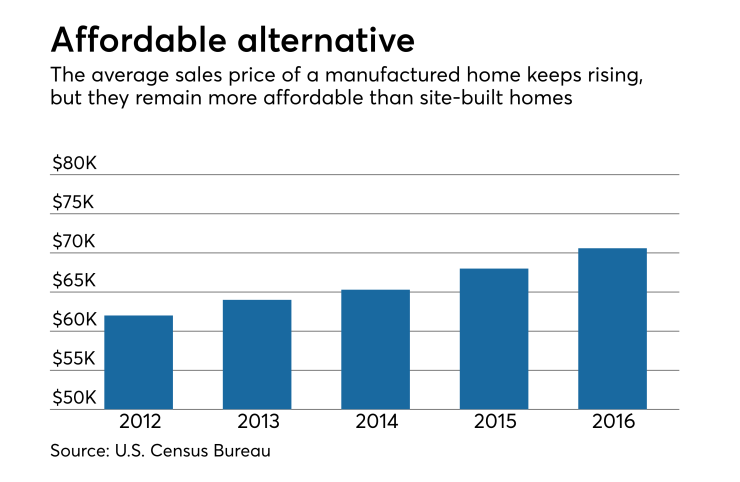A provision in the
The Truth in Lending Act currently prohibits employees of manufactured housing retailers from advising consumers on loan terms unless they are licensed mortgage originators. So while an employee can provide a list of local lenders that finance manufactured homes, they cannot discuss specifics about interest rates and fees or make suggestions about which lenders are most likely to make a loan.
That standard is more stringent than the one applied to real estate agents and homebuilders, who commonly provide this type of guidance to homebuyers, said Lesli Gooch, senior vice president for government affairs at the Manufactured Housing Institute.
"Manufactured housing customers are harmed because they are not receiving assistance from retailers," she said.

Even with the changes, manufactured housing retailers will still be prohibited from directly negotiating loan terms with the consumer or lender, something real estate agents and homebuilders can do, she added.
But the new disclosure requirements don't do enough to protect consumers from potential abuses that can arise from retailers steering homebuyers to their affiliates, said Phil Angelides, the former California state treasurer who chaired the Financial Crisis Inquiry Commission.
"It is the kind of quiet, but very damaging, loophole that will cause problems down the line," especially because manufactured home purchasers tend to have low-to-moderate incomes, he said.
Those consumers are "left to the mercy of the oral presentation making the sale and who knows to what extent they will wield that unaffiliated offer and how robustly that's done," Angelides added. "There's no question this opens the door to more abuses, period."
The restrictions on manufactured housing retailers were an unintended oversight in the Dodd-Frank Act and have resulted in
But consumer advocates paint a far different picture of the Dodd-Frank Act's original intent for regulating the manufactured housing market.
"There's no good public policy reason to do this," said Angelides.
"We know from the 2008 crisis that steering and yield-spread premiums drove a lot of people into loans they couldn't afford. There's no justification for rolling back the rules that apply to manufactured housing," he added.
There are
"It is an industry ripe with deceptive lending in terms of steering borrowers into higher cost loans than what they would have qualified for if they went outside of this joint affiliation," he said.
The existing requirement that employees be licensed loan originators provides a host of consumer protections, and the additional requirements being placed on retailers does not make up for the lost protection from the removal of that status, Astrada said.
"They are inefficient guardrails that don't go nearly far enough to curb the behavior that is already the norm in the industry during the actual transaction when you have the retailers sitting down with the borrowers going through their options," he said, adding the manufactured housing section of the Senate bill is symptomatic of overall problems in the ongoing regulatory relief efforts.
Such complaints are incorrect, Gooch said, because current rules prohibit all mortgage originators from steering consumers to loans with predatory features or effects. Furthermore, protections like the ability-to-repay rules will still apply when underwriting loans for manufactured homes.
"The provision does not allow for marketing of expensive loan products that are not beneficial to the consumer, as some have alleged — this is a complete falsehood and flies in the face of all of the Dodd-Frank protections in the current law," she said.





